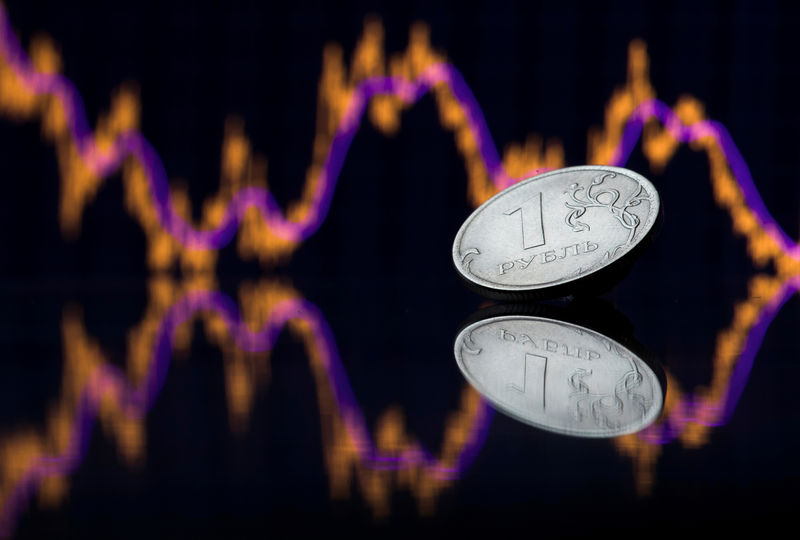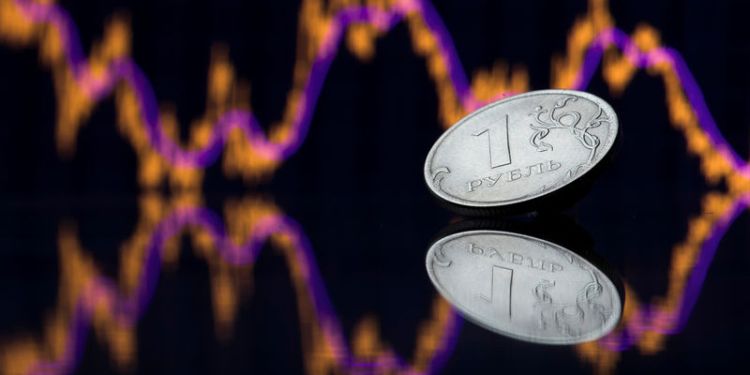 © Reuters. FILE PHOTO: A view shows a Russian one rouble coin in this picture illustration
© Reuters. FILE PHOTO: A view shows a Russian one rouble coin in this picture illustrationBy Elena Fabrichnaya and Andrey Ostroukh
MOSCOW (Reuters) – Russia’s central bank is considering asking banks and major companies to tell it in advance about foreign exchange deals that could affect the value of the rouble, three financial markets sources told Reuters.
Some banks are resisting the proposal on the grounds that it could affect their own businesses and compromise client confidentiality, according to the sources, some of whom are involved in writing a new code of conduct for the forex market.
A Russian finance ministry official denied the proposal would breach ethical standards, telling Reuters that banks would not need to disclose their clients’ names.
The official and other sources all asked not to be identified because the issue is sensitive and no final decisions have yet been made.
The new FX code, which is being drafted by the central bank, representatives of major banks and market associations, is intended to combat fraud and improve market efficiency. It will also bring Russian rules into line with global standards set out by the international Foreign Exchange Working Group (FXWG) https://www.bis.org/about/factmktc/fxwg.htm.
The central bank, which regulates the banking sector and financial markets, says a notification scheme would allow it to keep track of forthcoming currency deals that might affect the rouble’s exchange rate and market liquidity, the sources said.
Large corporate transactions have caused rouble volatility in the past.
In late 2014, the central bank intervened to prop up the currency as it fell in the wake of a 625 billion rouble ($9.43 billion) bond sale by Rosneft (MM:), even though the oil giant denied it was using proceeds to buy foreign currency.
The rouble had already weakened dramatically in response to plunging oil prices and Western sanctions imposed over Russia’s annexation of Crimea from Ukraine.
The central bank later described the Rosneft bond sale as not transparent.
Rosneft’s activity on the currency market has been mentioned during discussions about the new FX code this year but was not a reason for its drafting, one financial market source said.
REPORTING LINE
Experts were also studying the case of a former HSBC (L:) executive convicted in April of fraud related to a $3.5 billion currency trade in 2011, the source said. The executive devised a scheme through which the bank executed a series of trades in advance of a client’s order to make a profit, a practice known as “front-running”.
“As our FX experts are working on the FX code, as advised by the central bank, they have looked into this case from the point of view of ethics, violation of this code, and discussed how the Russian practice is taking shape,” the source said.
Another source close to the talks between the central bank and industry group the National Finance Association (NFA) said the idea of a “reporting line” had been discussed and is being considered. But no final decisions have been made, including the size of transaction needed before banks would have to inform the central bank.
“The decision is likely to be made no earlier than next year,” the second source said.
A third source familiar with the talks confirmed that the central bank and NFA have discussed the prospects of setting up such a mechanism.
Minutes of an NFA meeting held on June 21 showed the HSBC case had been discussed in the context of Russia’s existing FX code. Present at the meeting was Valery Lyakh, head of market violations monitoring at the central bank.
“A need to set up communication with the Bank of Russia was noted to inform the regulator in time about big client orders, execution of which could substantially affect prices in the unfolding market conditions,” the minutes said.
Asked if the central bank was proposing to set up such a channel, Lyakh told Reuters the committee had discussed the HSBC case and noted that some countries already have a practice of informing the regulator about upcoming big client orders.
“That was not the proposal for our (Russian) market,” Lyakh said.
Russia’s NFA said it had no view on the issue but that some market participants had raised the question of creating a communications standard after discussing the HSBC case.
FUEL FOR CONCERNS
The first financial market source said the proposal had not come from market participants, who opposed a notification clause in the FX code and had agreed to continue talks on the issue.
“The market is not craving to report to the central bank on top of what it has to under current law,” the source said, adding that the FX code remains voluntary: “No one has an obligation to sign it.”
The third source familiar with the talks also said banks were clearly against the initiative and were concerned about what kind of penalties they might face if they do not comply.
For now, the NFA committee had decided to treat the FX code as a whole as a recommendation and not a rule, sources said.
The initiative to report forthcoming deals to the regulator in Russia resembles the experience of some other emerging market countries and may bring Russia, which has a free-floating rouble, a step closer to stricter currency controls.
In China, cross-border deals above a certain size need government approval and companies require permission from the forex regulator to exchange yuan into foreign currency for overseas acquisitions.
India has no such formal requirements but it is common to inform the Reserve Bank of India about substantial transactions. The RBI dealing room also calls some banks on a daily basis to check what kind of FX flows they are seeing.
Asked about banks’ concerns, the second source close to the talks and others said the Russian central bank is already in a position to obtain market information not available to others.
“The central bank can ask and does ask anyone (about deals on the market), and this is considered to be normal,” said a source close to the regulatory authorities.
“Deals that could affect the exchange rate are the size of hundreds of millions of dollars, and there are not many clients (who trade such large volumes).”
(Addtitional reporting by Darya Korsunskaya in Moscow, Samuel Shen in Shanghai and Suvashree De Choudhry in Mumbai; Writing by Andrey Ostroukh; Editing by Catherine Evans)
Source: Investing.com
























